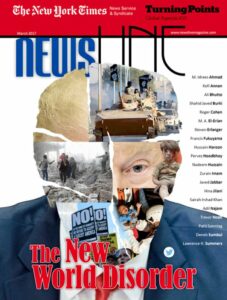Najam Writes Op-Ed on ‘The New World Disorder’
 Adil Najam, Dean of the Frederick S. Pardee School of Global Studies at Boston University, recently published an essay that argues politics around the world have taken a very sharp turn towards populism, authoritarianism and a ultra-nationalism that seems so systemic it could potentially be the beginning of a “New(er) World Order.” Even if it is not, Najam argues, “it is clear that whatever the world order was, it is now imploding before our eyes.”
Adil Najam, Dean of the Frederick S. Pardee School of Global Studies at Boston University, recently published an essay that argues politics around the world have taken a very sharp turn towards populism, authoritarianism and a ultra-nationalism that seems so systemic it could potentially be the beginning of a “New(er) World Order.” Even if it is not, Najam argues, “it is clear that whatever the world order was, it is now imploding before our eyes.”
Najam’s essay was published as the cover story of the March 2017 issue of the news magazine Newsline, in its special “Turning Points: Global Agenda 2017” issue (in collaboration with The New York Times). Titled, “The New World Disorder,” the essay makes the case that political trends in the United States are part of a larger global shift.
Like passers-by who are simply incapable of looking away from a car crash, our morbid curiosity keeps us fixated on the latest tantrum from Trumpland, or the newest Brexit brouhaha. Deeply consequential, even phenomenal, as America’s choice of Donald Trump and Britain’s decision to Brexit are, they are not in themselves the phenomenon. They are, instead, the most shocking manifestations of a much larger, and global, phenomenon. Possibly the beginnings of a new global normal. Maybe even the beginnings of a New(er) World Order.
Najam goes on to suggest that there are at least four key dynamics that define this trend: (1) the politics of anti-politics, (2) a demand for authoritarianism, (3) the rise of ultra-nationalism, and (4) post-truth techno-populism. Some excerpts:
If not itself the root, very close to the root of the phenomenon we are living through, is a politics of anti-politics. A deep disdain, not only for politicians, but for the idea of politics All around the world, almost without exception, one finds politicians being lambasted and politics being portrayed not just as a bad word, but as an essentially vile act.
… About half the world’s population, about three-fourths of the world’s economy, and about four-fifth’s of the world’s military is now under the control of one ‘strongman’ or the other; each inclined to demonstrate power by deploying it. Some itching to fight a ‘manageable war.’
… Most prominent is the erosion of multilateralism. The two grand experiments of our generation – the European Union and the United Nations – are both under strain. Equally telling is the decay of the Left-Right political spectrum that has been the staple of understanding and managing political divisions for a century.
… The post-truth society we live in is a child of information technology. After all, the best place to bury truth, is noise… Where attention spans are short, the flow of information fast, and truth irrelevant, populism will thrive. When there is no mechanism to determine what is ‘right,’ the number of prominently displayed ‘likes’ become a poor substitute for truth and an intoxicating fillip for the populist. Mr Trump became the ‘Emperor’ of Twitter for the very same reasons that Mr Modi was proclaimed ‘King of Selfies.’